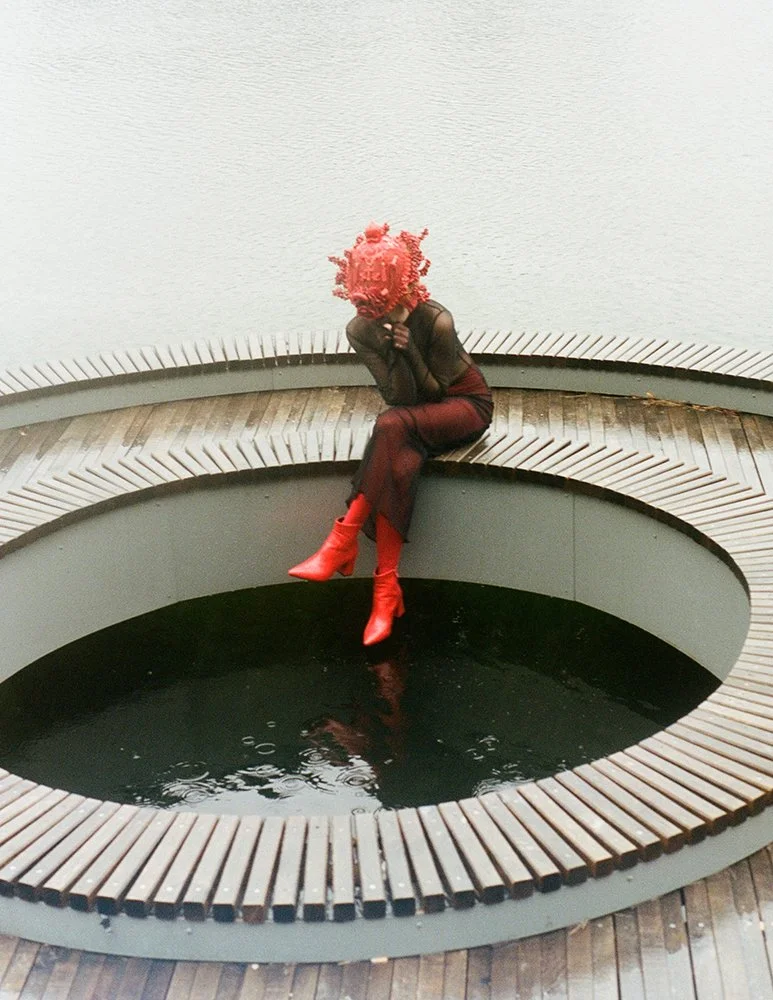BETTER THO, BOLDER NOW: HOW BENJAMIN ELGAR IS REWRITING THE RULES OF POP
BY IRVIN RIVERA
PHOTOGRAPHER: IRVIN RIVERA, FASHION STYLING: BRANDEN RUIZ, GROOMING: PATRICK SANTA ANA, DIGITECH: PHIL LIMPRASERTWONG, PHOTO ASST: ANDREW LOPEZ
BENJAMIN ELGAR doesn’t just write songs, he builds universes. In his debut album Make It Through the Night, a cinematic fever dream of nocturnal longing and emotional reckoning, the Paris-born, Bucharest-bred artist joins forces with The Last Artful, Dodgr and John Ho to craft a sonic ritual where heartbreak, lust, and defiant joy all take center stage. It’s theatrical, yes, but never at the expense of truth. “At night, you meet yourself,” Elgar says, “and with this album, I want people to feel like they’re meeting me in that same place.” With singles like *Better Tho* gaining global resonance and *HOE* turning reclamation into choreography, Elgar’s universe isn't just expanding, it’s erupting.
But behind the glamour and glitter is a kid who once stared at Thriller on VHS, transfixed, already mapping out his escape plan from small-town survival to worldwide connection. “France gave me beauty and art, Romania gave me strength and survival,” he tells us. This is a story about music, yes, but also about self-making—about turning pain into pop and ritualizing the parts of ourselves we once tried to hide. From schoolyard bullying to self-produced club nights, to finding chosen family in the Los Angeles creative scene, Elgar’s journey is as raw as it is theatrical. And when asked what he’d tell the younger Benjamin who once promised himself he’d “get out,” he doesn’t hesitate: “You were right to believe.”
How did growing up between France and Romania shape your earliest musical memories, and what was it like for a five-year-old Benjamin seeing Thriller on loop and already picturing your own future as a pop artist?
Growing up between France and Romania gave me two very different energies. France gave me beauty and art, Romania gave me strength and survival. When I saw Thriller and other iconic music videos, it wasn’t just music videos to me, it felt like a sign. I remember watching them over and over and thinking: this is my future. I knew then that I wasn’t meant for a small life, I was meant to create something that would reach people everywhere.
When you say you changed schools after being bullied for being queer, and made a promise to yourself to ‘get out of here,’ can you walk me through how that moment reoriented your artistic vision and personal identity?
Being bullied was painful, but it pushed me to make a promise to myself: one day I’ll get out, and I’ll turn this pain into something bigger. That moment gave me direction. It shaped my identity and my vision as an artist. I decided that my music would always be about hope, for myself and for anyone who feels different.
You’ve spoken about wanting to build art that would’ve given young Benjamin hope. As someone who grew up without a model like that, how do you now see yourself stepping into that space for others?
I don’t agree when people say there were no models. There were legends who gave me hope, Freddie Mercury, Elton John, George Michael… icons who opened doors and proved that being yourself could shake the world. Every artist has to create their own universe. Thanks to them, I have the freedom to build mine. And now I’m stepping into that space not to replace what came before, but to expand it
At 16 you were already self-directing club shows—bringing your own dancers, working the lighting, producing visuals. Looking back, how did those early DIY performances teach you lessons about control, audience, and trust in your own vision?
It taught me that nobody will believe in your dream if you’re not willing to fight for it yourself. It gave me confidence that my vision was strong enough to carry.
How did it feel to move from those early live club performances in Romania to arriving in Los Angeles? In what ways did the shift in geography deepen or challenge your identity as a performer?
Moving in LA was like stepping into the world I always imagined for myself but it was also humbling. In Romania, I was already building little universes but in LA, I had to start from scratch. I realized talent wasn’t enough. You had to bring vision, discipline, and resilience to survive in that city.
When you finally met collaborators who ‘became like family,’ like The Last Artful, Dodgr and John Ho, what changed in your creative process, and how did your sense of being seen as an artist shift?
It was the first time I felt truly understood. I didn’t have to over-explain myself, I could just create. That kind of trust changed everything, it allowed me to take risks I probably wouldn’t have taken alone. It felt less like work and more like finally finding a place where I belonged.
The album is structured around nocturnal thought, longing, and emotional reckoning. How did the phrase Make It Through The Night emerge as the album’s title, and how did that phrase evolve in meaning as you were writing and recording the album?
The night is when the truth comes out. During the day we all perform. We wear masks for family, friends, lovers, the world. But when you lay in bed, when the lights are out, that’s when the real you speaks. That’s where this album lives. Make It Through The Night is my altar to those moments: longing, heartbreak, lust, love, madness. It’s when your real side wakes up, the side you try to hide. I wanted this album to be bigger than just songs; I wanted it to feel like a ritual, like stepping into another dimension where all of those feelings are sacred. At night, you meet yourself and with this album, I want people to feel like they’re meeting me in that same place.
How do you balance theatrical, camp, cinematic storytelling with authentic emotional vulnerability in your music? In other words: how do you decide when to turn up the spectacle and when to soften into just telling the raw emotional truth?
I love big visuals and cinematic storytelling, t’s part of who I am. But at the same time, the heart of my music is honesty. I balance the two by always asking myself: is this moment about dazzling people, or is it about opening my heart? Both are important.
When Better Tho started resonating globally and you realized you weren’t singing into a void anymore, how did it change your perception of your work—did it make you feel more pressure, or more freedom?
When Better Tho started connecting with people, it made me feel like I wasn’t alone anymore. For so long, I was working without knowing if anyone would connect. That didn’t feel like pressure, it felt like a gift. It reminded me why I started in the first place.
HOE is a confrontation and reclaiming of identity, and you’ve called it a ritual. Can you walk me through the creative process behind HOE—how the sound, visuals, choreography, and message came together—and how you hope audiences will receive or replay that ritual in their own lives?
HOE is all about taking back power. We took a word that was meant to hurt and made it into something strong and celebratory. From the sound to the visuals to the choreography, it’s about liberation. I want people to play it and feel that same sense of freedom for themselves.
Now that your debut album is out in the world, how do you feel you’ve changed from the person who made that promise as a bullied teenager? If you could speak directly to that younger self now, what would you say?
I’d tell him: you were right to believe. One day, the things you feel ashamed of will become the things that make you powerful.
What mistake or misconception about yourself or your music do you most hope this album helps dispel?
That pop has to be shallow. For me, pop is one of the deepest languages we have. It can make pain danceable, it can turn personal stories into collective anthems. I hope this album shows that.
If you were a book, what book would you be and why?
I’d probably be a diary written by someone with ADHD and emotional instability. Chaotic, dramatic, impossible to put down, but also lit up with moments of clarity that feel almost sacred. That mix of mess and magic is exactly what my music is.

















